|
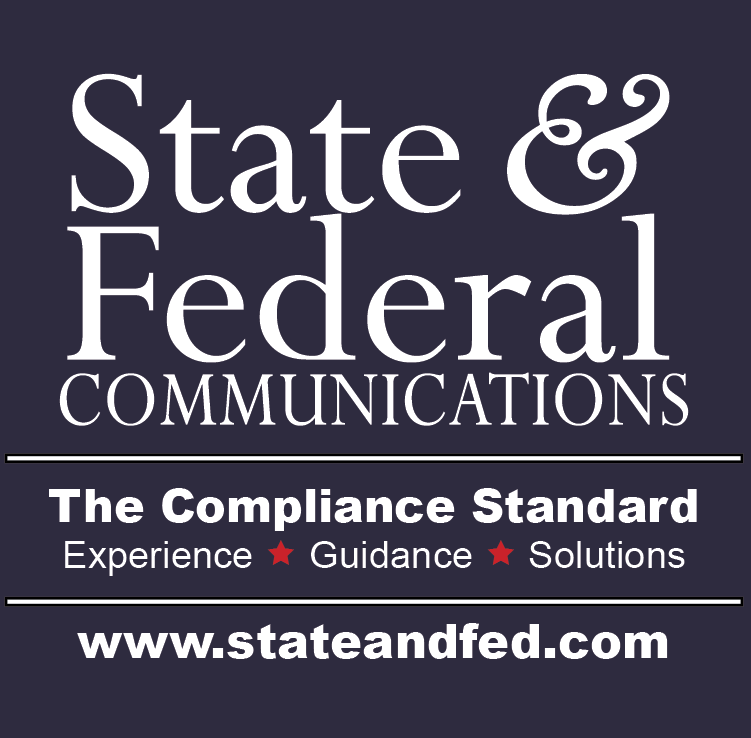 |
 |
E-News from State and Federal
Communications, Inc.
JANUARY 2019
Martha Hughes Cannon
First State Senator |
|
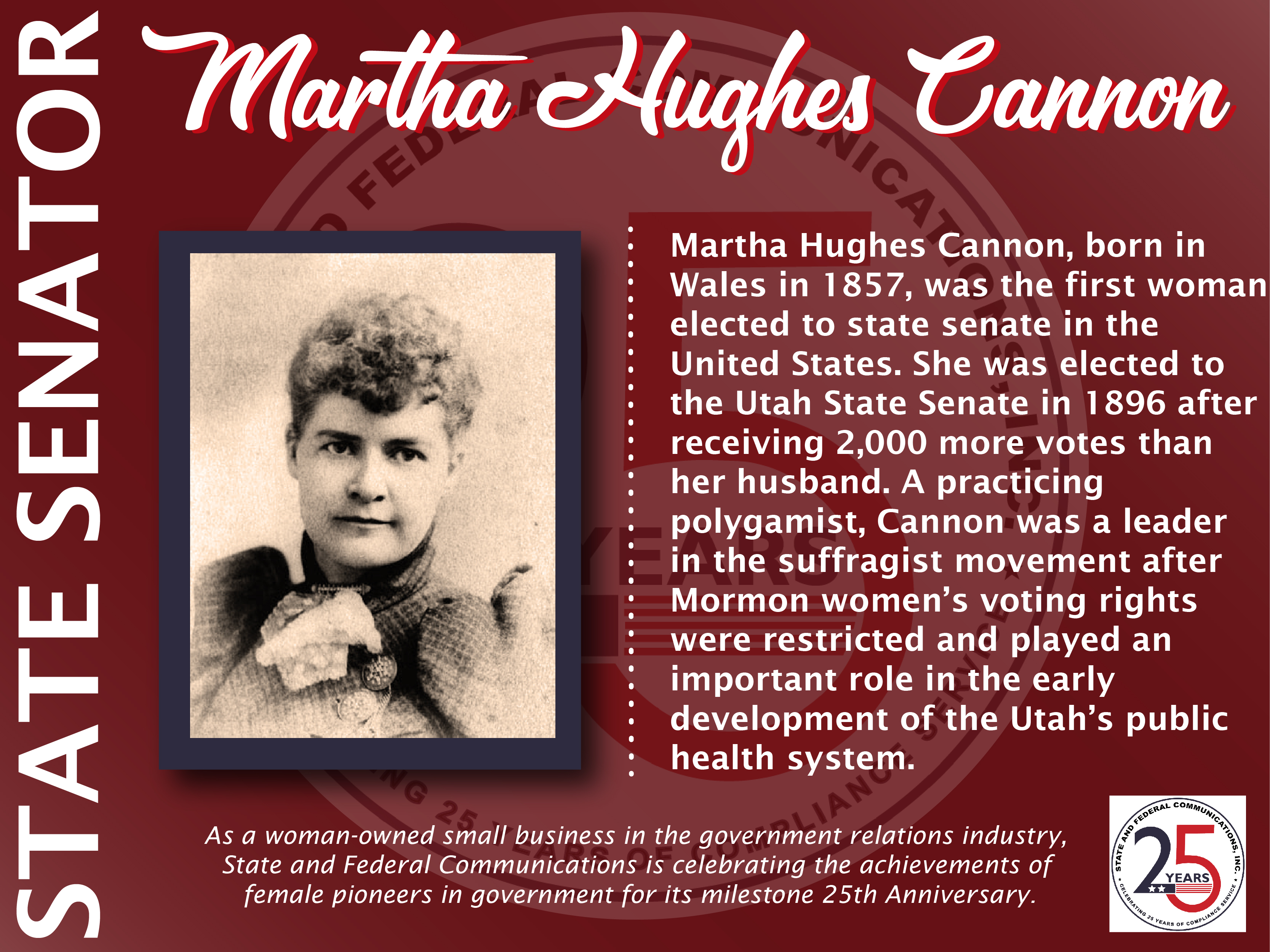
Martha Hughes Cannon,
born in Utah in 1857, wore many hats during her life. She graduated from the
University of Pennsylvania’s school of Pharmacy and returned to become a
physician for the Salt Lake City community. She was also a school teacher, a
secretary, dishwasher, and a typesetter for the local paper. Although Cannon
wore many hats, she adds one more to the list. Cannon becomes the first woman to
elected a state senator in 1896.
Martha,
also known as “Mattie,” wanted to become a doctor and had the opportunity to
attend the University of Pennsylvania. When she graduated, she returned to Utah
and worked at Deseret Hospital, where she met her husband Angus. Later, they
married and had three kids. Unfortunately, since Mattie was in a polygamist
relationship, she was exiled to England for a short stint of time. When she
returned to Utah, she created her own medical practice, and was a huge advocate
for the health of her community.
After she
started her practice, she ran for state senator of Utah. She ran as a Democrat,
against her husband, a Republican, and won by 2,000 votes. Cannon was the
creator of the State Board of Health while she was a senator. After her time as
senator, she was on the Utah’s State Board of Health and helped create many of
their policies.
Martha, a
huge advocate for heath, became a doctor, developed her own practice, and helped
establish the State Board of Health. She also became the first woman to become a
state senator. Martha is looked at an icon for women all over the world because
she pursued her love of health and became a national figure who worked hard to
pass bill after bill to help protect the health of the disabled, working women,
and for better sanitation in the state.
Join us
next month for another update on first-elected women. Cora Belle Reynolds
Anderson, was the first woman elected to the U.S. House of Representatives.
February will conclude our six-month review of these fabulous firsts. Many
thanks to Research Associate Alexandria Vernis JD and Interns Peter Keares and
Sam Waller for putting this series together.
Thank you.
Elizabeth Z. Bartz
President and CEO
@elizabethbartz |

Prince Edward Island Lobbying Law
Effective April 1, 2019
George Ticoras, Esq.
Research Associate

The new lobbying law for the province of
Prince Edward Island is scheduled to come into force April 1, 2019,
according to the Department of Justice and Public Safety. Bill No. 24,
the Lobbyist Registration Act, was passed in December 2017 during the
third session of the 65th General Assembly of the Prince Edward Island
Legislative Assembly and has already received Royal Assent. Currently
the province is setting up an Office of the Lobbyist Registrar.
Upon the Act coming into force, consultant
lobbyists, in-house lobbyists, and employers of in-house lobbyists will
be required to register with the registrar when communicating with a
public office holder, directly or through grassroots communications, in
an attempt to influence them on a variety of issues. Additionally, a
consultant lobbyist will be required to register when communicating with
a public office holder to influence the awarding of any contract by or
on behalf of the Crown or arrange a meeting between a public office
holder and any other person. Registrants will be required to file
returns with the registrar every six months detailing the relevant
subject matters lobbied, including legislative and regulatory proposals;
the techniques of communication the lobbyist has used or expects to use
to lobby; the employer or client for which the registrant is lobbying;
and the identification of entities or persons paying more than $750 per
fiscal year to the registrant to lobby.
Lobbying on a contingency fee basis is
prohibited for consultant lobbyists and former public office holders are
prohibited from lobbying for a period of six months after leaving
office. Penalties for violations of the Act include fines up to $25,000.
Each of Canada’s 10 provinces have laws regulating lobbying.
[The details for this
article will be updated on our website in the Lobbying Compliance Laws
and Procurement Lobbying Compliance Laws for Prince Edward Island.] |
 Summary of Changes UPDATE Summary of Changes UPDATE
Note Recent Changes to
Compliance Regulations
Michael Beckett, Esq., Research
Manager
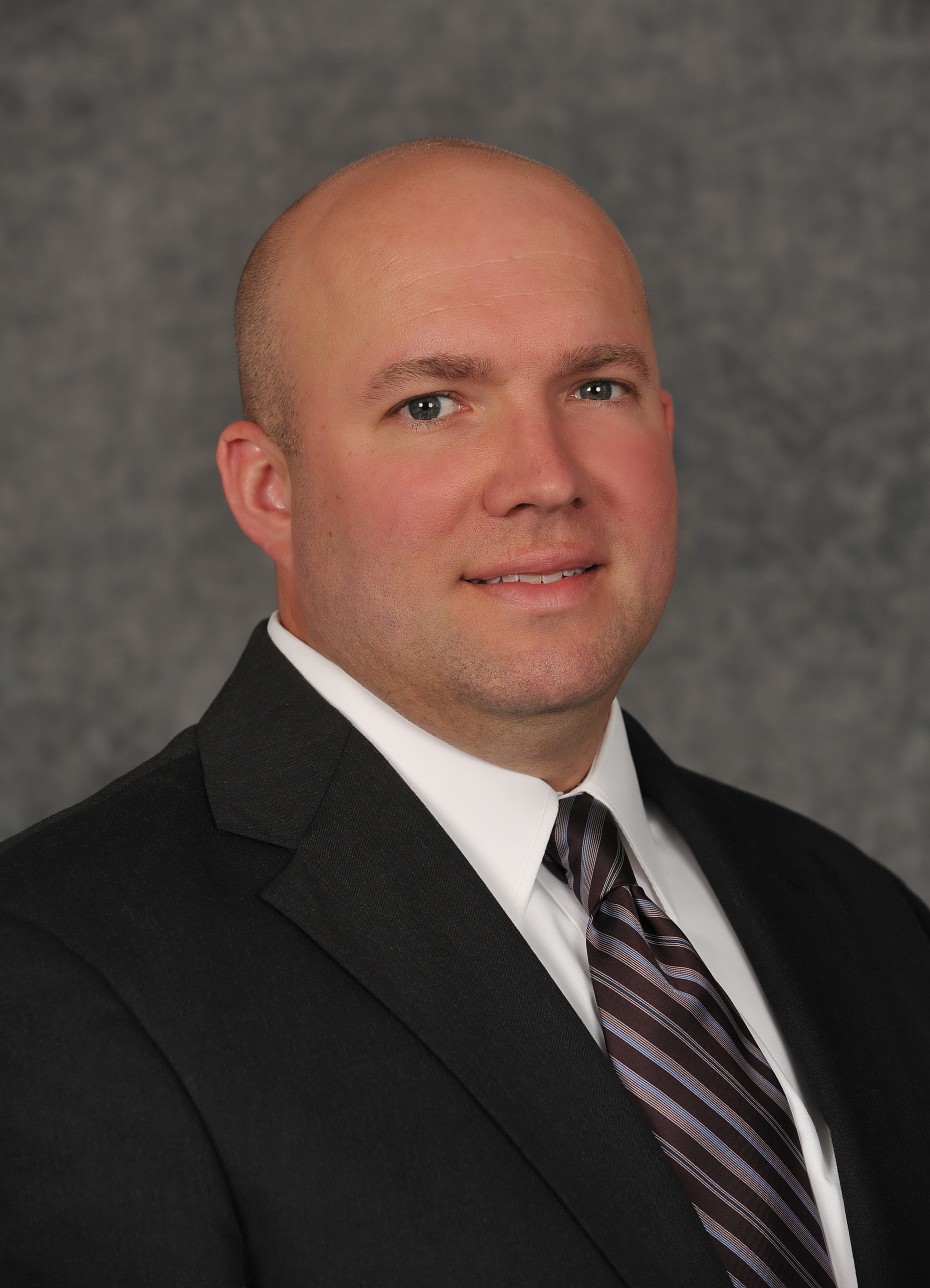
BALTIMORE, MARYLAND: City Council
passed an ethics bill introduced by City Councilman Zeke Cohen.
Ordinance No. 18-0230, also known as the Transparency in Lobbying Act,
became law without the mayor’s signature on December 3. The ordinance
requires lobbyists to file reports twice a year and affirmatively
identify their clients when approaching city government officials.
Additionally, any lobbyist violating the act may be banned for a period
of three years. An amendment was adopted to delay the effective date of
the reporting provisions. As a result, lobbyists will file the annual
report due January 31, 2019. Following the 2019 annual report, lobbyists
will likely report semiannually beginning with a report due on July 31,
2019. The bill will be effective March 3, 2019, but the section
impacting reporting requirements will be effective March 3 or 30 days
from a viable online reporting system being implemented, whichever is
later.
HAWAII: The Ethics Commission will
launch a new electronic filing system for lobbying registrations and
disclosures beginning in January 2019, allowing lobbyists and
organizations to register online for the 2019-2020 legislative biennium.
Lobbyists who plan to continue lobbying in 2019 must renew registrations
by Monday, January 28, 2019. Commission staff are available to assist
lobbyists who have already registered for the 2019-2020 lobbying period
via a paper filing. Lobbying expenditure reports for 2019 may be
submitted electronically through the new e-filing system as early as
March 2019.
MISSOURI: A panel of the U.S. Court
of Appeals for the Eighth Circuit affirmed a district court ruling that
Missouri statutes regarding lobbyist registration and reporting were
constitutional. In Calzone v. Summers, the U.S. Court of Appeals
for the Eighth Circuit upheld the decision of U.S. District Court for
the Western District of Missouri finding the First Amendment does not
shield unpaid individuals designated to act as lobbyists from
registration and reporting requirements under sections 105.470 and
105.473 of the Missouri Revised Statutes.
PORTLAND, OREGON: Mayor Ted Wheeler
submitted to City Council a proclamation stating the recently passed
campaign finance ballot measure is enacted and in effect. The Honest
Elections City of Portland Charter Amendment prohibits corporate
contributions and limits contributions from individuals and committees
to $500 per election cycle. The measure also caps independent
expenditures and is likely to face legal challenge. City Council is
expected to submit the measure to the local circuit court for validation
early next year.
YUKON TERRITORY, CANADA: Yukon will
likely have its first lobbying law sometime in 2019. Bill No. 23, the
Lobbyist Registration Act, received Royal Assent in November, but is not
yet in effect. The Act will come into force on a day or days to be fixed
by the commissioner in executive council. Upon the Act coming into
force, consultant lobbyists and in-house lobbyists will be required to
register. Registration will be required for individuals communicating
with a public office holder, directly or through grassroots
communications, for attempting to influence. Additionally, a consultant
lobbyist will be required to register when arranging a meeting between a
public office holder and any other person for the purposes covered by
the Act. There are two revolving door provisions in the Act. For the
six-month period after ceasing to be in office, a former public office
holder is prohibited from lobbying as a consultant lobbyist, but he or
she is not prohibited from immediately lobbying as an in-house lobbyist.
Additionally, a consultant lobbyist is prohibited from becoming an
employee of Yukon’s public service for six months after termination of
lobbyist registration. Penalties for violations of the Lobbyist
Registration Act include fines up to $25,000 for the first violation and
up to $100,000 for each subsequent violation. |
Legislation We Are
Tracking
At any given time, more than 1,000
legislative bills, which can affect how you do business as a government
affairs professional, are being discussed in federal, state, and local
jurisdictions. These bills are summarized in State and Federal
Communications' digital encyclopedias for lobbying laws, political
contributions, and procurement lobbying and can be found in the client
portion of our website.
Summaries of major bills are also included
in monthly email updates sent to all clients. The chart below shows the
number of bills we are tracking in regard to lobbying laws, political
contributions, and procurement lobbying.
| |
Total bills |
Number of Jurisdictions |
Passed |
Died |
Carried over
to
2019 |
|
Lobbying Laws |
429 |
54 |
38 |
232 |
23 |
|
Political Contributions |
704 |
54 |
64 |
427 |
28 |
|
Procurement Lobbying |
571 |
55 |
50 |
311 |
39 |
|
 |
W E B S I T E
T I P
We have added a resource
chart to the website entitled “Inaugurations Guide - Based
on November 2018 Elections.” The guide provides inaugural
compliance information for each governor elected this past
November. The chart includes the governor’s name, party,
inauguration date, and rules on tickets to events and
contributions to inaugural committees. Be sure to consult
the chart if you and your company intend to provide
resources for these high-profile and often scrutinized
events. |
|
|
|
ASK THE
EXPERTS
State and
Federal Communications’ Experts Answer Your Questions
Here
is your chance to “Ask the Experts” at State and Federal
Communications, Inc. Send your questions to
experts@stateandfed.com.
(Of course, we have always been available to answer
questions from clients that are specific to your needs, and
we encourage you to continue to call or email us with
questions about your particular company or organization. As
always, we will confidentially and directly provide answers
or information you need.) Our replies are not legal advice,
just our analysis of laws, rules, and regulations.
|
 |
I have heard Vermont has enacted a new pay-to-play law. What can
you tell me about the new law and how it affects contributors? |
|
|
 |
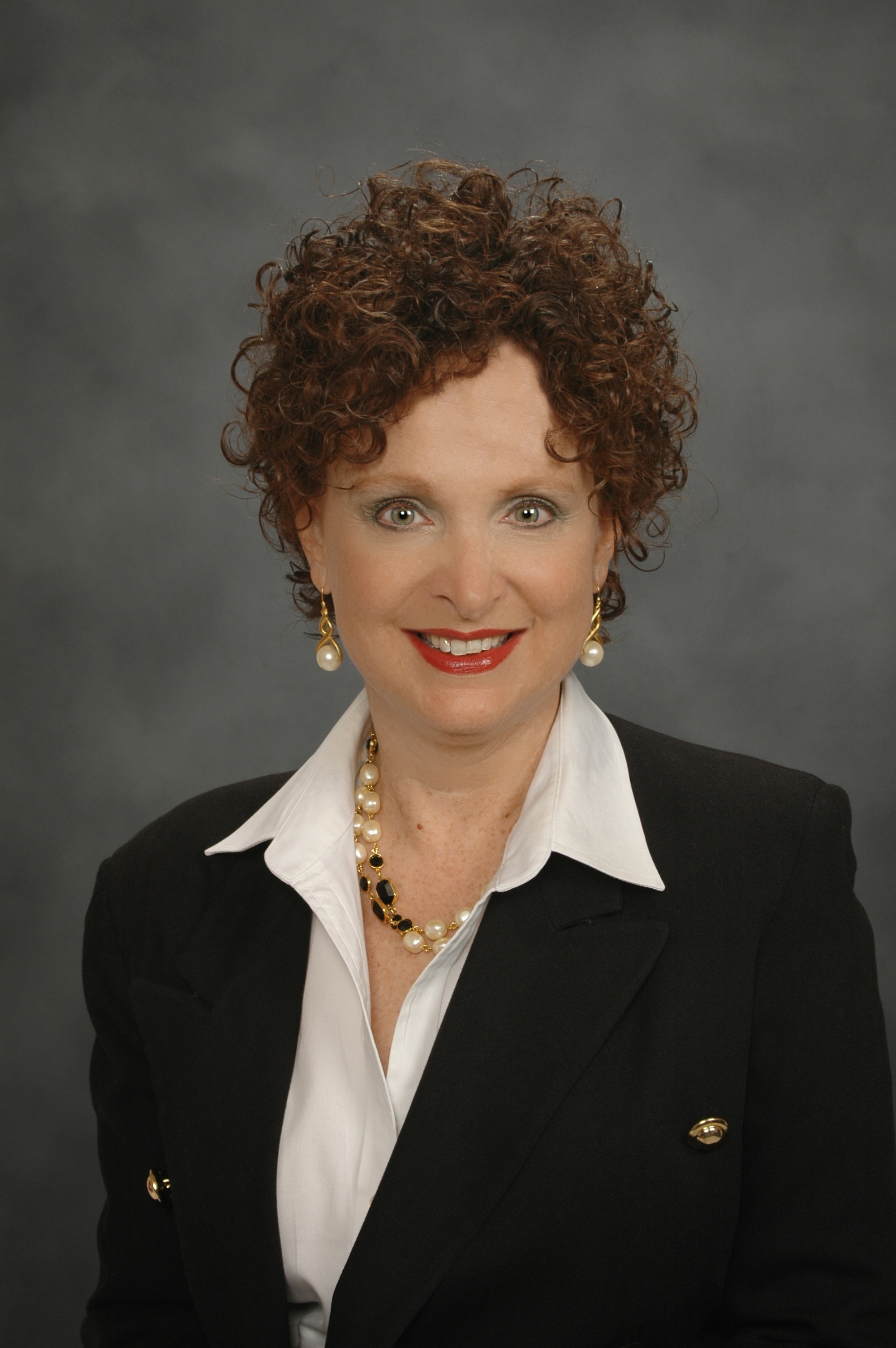
Vermont’s new pay-to-play law went into effect
December 16, 2018. It breaks down into contributor
restrictions and contractor restrictions.
Contributor restrictions:
If a person makes a contribution to a state officer or a
candidate for a state office, or if his, her, or its principal
or spouse makes such a contribution, that person may not
negotiate or enter into a sole source contract valued at $50,000
or more or multiple sole source contracts valued in the
aggregate at $100,000 or more with that state office or with the
state on behalf of that office within one year following...
Read the full article here
For more information, be
sure to check out the “Pay-to-Play” section of the
U.S.
Procurement Lobbying Compliance Laws online publication for
Vermont.
Please feel free to contact us if you have any
questions.
Nola R.
Werren, Esq., Client Specialist
Click here to read ALL Ask the Experts
articles in full
Please fill out the small form to
gain access to all articles free!
Thanks.
Click here for subscription information
|
|
|
|
|
|

State and Federal
Communications, Inc.
Scrapbook -
January 2019
|
I was
reminded over the 2018 holidays -
You Can't Make Old Friends.
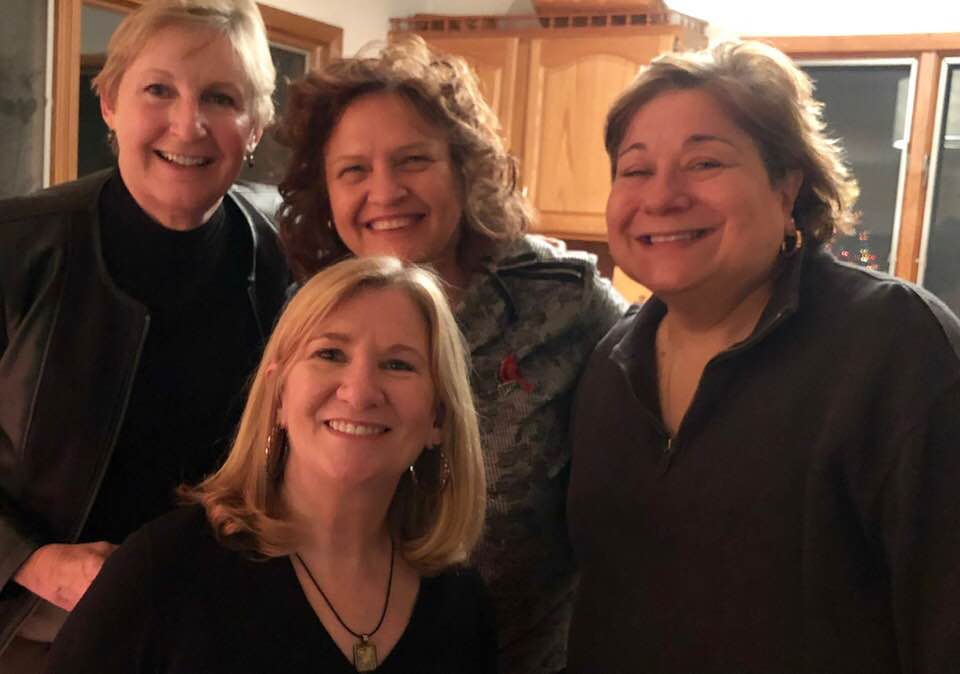
Pam
Anderson, Judith Zimomra, Elizabeth Bartz,
and Diane Laney Fitzpatrick - Kent State Alumni &
Friends
|
I love seeing former interns.

Former State and Federal Communications
Interns:
Luke Hall, Scott Hall, Elizabeth Bartz,
and Jerry Hall. |
|
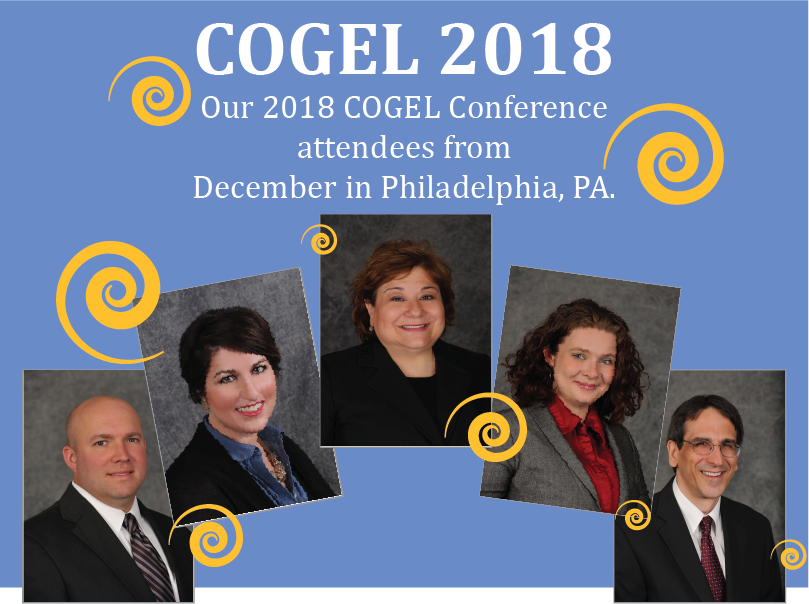
Attendees (l - r)
Michael Beckett, Esq., Research Manager; Amber Fish
Linke, Esq., Director, Client and Product
Operations; Elizabeth Z. Bartz, President and CEO;
Myra Cottrill, Esq., Client Specialist; and Jim
Sedor, Editor. |
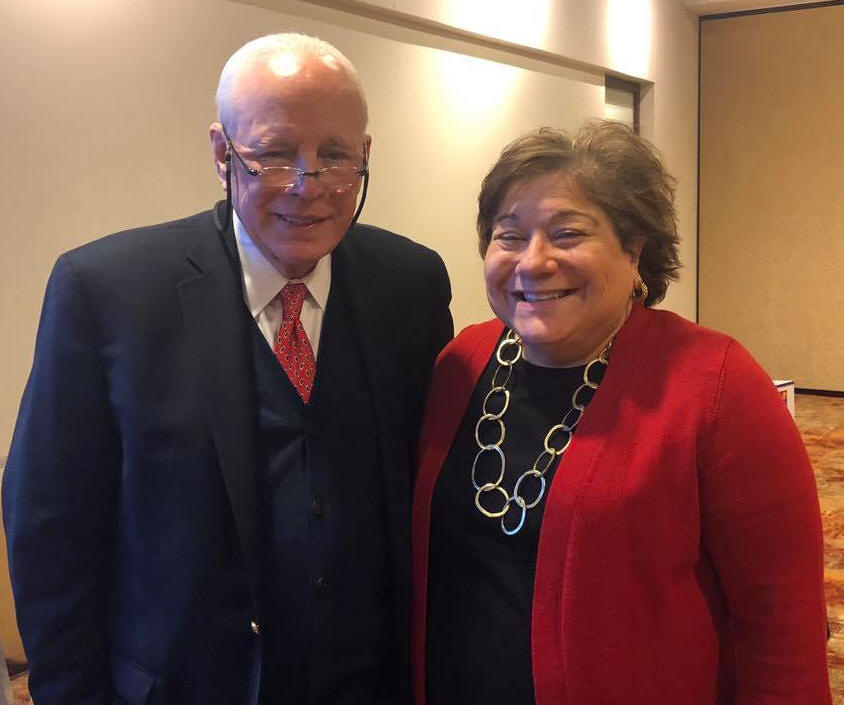
John Dean, Akron, OH
native, New
York Times
Bestselling
Author, & former White House Counsel
to President Nixon with Elizabeth Z. Bartz at COGEL.. |
|

Plan to say hello at future
events where State and Federal
Communications, Inc.
will be attending and/or
speaking regarding compliance issues. |
|
|
January 10, 2019 |
PRSA Akron Area Chapter, Akron, OH |
|
January 15, 2019 |
Diversity Partners Present: #MostDiverseCongressEver,
Washington, DC |
|
January 17, 2019 |
Akron Roundtable, Akron, OH |
|
January 17-19, 2019 |
NCSL Winter Executive Committee Meeting, New Orleans,
LA |
|
January 21, 2019 |
Akron Urban League MLK Jr. Day Breakfast, Akron, OH |
|
January 23, 2019 |
GPN Welcome the 116th Congress Reception, Washington,
DC |
|
January 23-25, 2019 |
US Conference of Mayors--Winter Meeting, Washington,
DC |
|
January 28-31, 2019 |
PAC Advocacy Conference, Key West, FL |
|
COMPLIANCE
NOW is published for our customers and friends.
Click here
to
SUBSCRIBE
or
click
here to UNSUBSCRIBE.
Click here to send us comments regarding
the COMPLIANCE NOW e-newsletter.
State and
Federal Communications, Inc. | Courtyard Square | 80 South
Summit St., Suite 100 | Akron, OH 44308 |
| 330-761-9960 |
330-761-9965-fax | 888-4-LAW-NOW|
http://www.stateandfed.com/

|
 |
The Mission of State
and Federal Communications is
to make sure that your
organization can say, "I Comply."
We are the leading
authority and exclusive information source on
legislation and regulations surrounding campaign finance
and political contributions; state, federal, and
municipal lobbying; and procurement lobbying.
Contact us to learn how
conveniently our services will allow you to say "I
Comply" for your compliance activities.
http://www.stateandfed.com |
www.stateandfed.com |
|